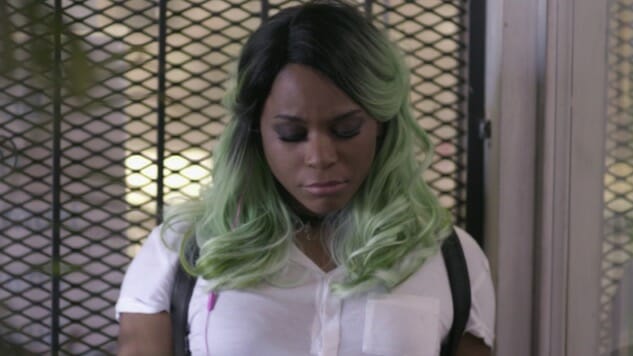Transparent‘s New Season Begins with One of Its Most Exquisite Episodes Yet

This review contains spoilers from episodes one and two of Transparent, Season Three.
In the sun-spotted glade where Rabbi Fein considers her “Thoughts on Passover,” Nina Simone’s wrenching cover of “Ne Me Quitte Pas” (“Don’t Leave Me”) assumes an existential weight. Against inserts of blooming flowers and frayed palms, the song’s lament suggests the fear Raquel relates in her poetic, personal exegesis, the fear that the divine has gone silent. But in “Elizah,” one of Transparent’s most exquisite episodes—and, to a lesser extent, in the more workmanlike “When the Battle Is Over”—the central question isn’t, “Are you there, God?” It is, rather, the self-interrogation Raquel urges as the ambulance rides off with Maura, her understanding of the individual as the earthly emblem of the sacred. “What if the miracle was you?” she asks. “What if you had to be your own Messiah? Then what?”
It’s the notion that the “you” in this equation is forever fated to remain a work in progress that runs through the first two episodes of Transparent’s third season. As Maura explains to her roommate, Davina, the fragments of contentment are arrayed in front of her—her relationship with Vicki; her work at the LGBT call center; her family’s support for her transition—but she can’t seem to piece them together into an adequate whole. The same might be said of Sarah, babbling on about her unorthodox arrangement with Len to the temple board as if to justify it, not only to those for whom the acronym “LGBT” is a reminder of BLTs, but also to herself. Or of Ali, suspicious of Leslie’s ephemeral attentions, and Josh, standing apart from his colleagues at work as if to underline his isolation. Even the most confident of the Pfeffermans sees potential success in the terms of self-help: The aphoristic wisdom of Shelley’s “temple talk” soon segues into her idea for a one-woman show, “To Shel and Back.” (Perchance to dream, we’ll see a scene from it this season, or in a subsequent one.)
“Mother told me there’d be days like this,” as the Wheel of Fortune puzzle on a hospital TV has it, though with “Elizah” and “When the Battle Is Over,” Transparent implies that “days like this” are not the exception, but the rule. Indignities and frustrations arise with clockwork precision, most small—the purposeless meeting, the mentor’s quick criticism—some large—the application of male pronouns to a trans woman—all more difficult to slough off than our explanations and rationalizations would suggest. (“I always say that there is a difference between thinking and over-thinking,” Leslie offers, emptily.) It’s worth noting that Josh and Ali’s adolescent selves, like their adult ones, sing a “honeymoon sonata” whose simple future is always out of reach. The “when” of the title is more prospective than prescriptive: In Transparent, a series consumed by our many evolutions, the battle to be, or to become, never arrives at a firm conclusion. “Then what?” is life’s animating principle.
Whether Maura learns this, in the lovely, elegiac “Elizah,” remains unclear, though we know by now that creator Jill Soloway is not in the business of meting out morals or dispensing lessons. Crisp, focused, and beautifully crafted, the season premiere is composed of questions that hang in the air, unanswered: “Why am I so unhappy?” “What’s wrong with me?” Its subject is the struggle to forge a truce with oneself, made more challenging by the fact that “oneself” is no stable axis, and Elizah’s desperate call to the center’s hotline throws Maura’s own stresses into sharp relief. So, for that matter, does Soloway’s sublime direction, shifting the composition of the conversation as it unfurls. At first, Elizah’s voice is scarcely audible; soon, cutaways to her green hair and bright pink earbuds attach color to her sound; finally, as Maura coaches her to a safe space to breathe, and cry, we see the complete shape of Elizah’s body, her full and expressive face. It is, as I read it, an act of transference, Maura’s reserves of calm depleting as Elizah’s replenish, leaving the former weakened, emotionally and physically, as she embarks on her quixotic search.
-

-

-

-

-

-

-

-

-

-

-

-

-

-

-

-

-

-

-

-

-

-

-

-

-

-

-

-

-

-

-

-

-

-

-

-

-

-

-

-








































